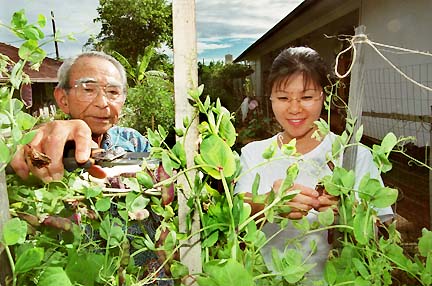Advertisement - Click to support our sponsors.


Dig This![]()
Friday, June 23, 2000

By Craig T. Kojima, Star-Bulletin
Rev. Gyoko Saito shows off his Egyptian beans.
EVEN for a professional skeptic, sometimes a story is so good it just begs to be believed. Is this Tut tale more
than a hill of beans?Rev. Gyoko T. Saito, bishop at Higashi Hongwanji mission, believes he has cultivated beans descended from those found nearly 80 years ago in King Tutankhamun's tomb. I'd like to believe it too.
The lovely bean plants with their purple pods were planted in the mission garden just three months ago. They produced delicate flowers with petals of fuchsia and lavender. Earlier this week, he harvested his crop.
"Only three months, that really surprised me," said Saito. "I've been really amazed myself watching. As soon as I wake up, I go to the garden." He used no fertilizer on the plant and credits Hawaii's climate with its rapid growth and prolific output.
His sister-in-law, who first gave him the Egyptian beans five or six years ago, plants in November and does not harvest until April. But she lives in Japan, which lacks our year-round growing season.
The beans entered Saito's life through a newspaper article published in Japan in 1991.
According to that story, the seeds were originally found when English Egyptologist Howard Carter excavated Tutankhamun's tomb in 1922.

The beans are said to have been entombed for 3,300 years, and Carter reportedly tended them until they sprouted and grew into healthy plants."After this was known, many people wanted offspring seeds of these plants," said Saito.
According to the news article, in 1956, Haruki Taki of Kyushu obtained some of the beans and set about growing them. He was successful and his desire to share the seeds led to the article. Taki agreed to send seeds to the first 100 people that called the paper. Saito's sister-in-law was one of those people.
She shared beans with Saito and his wife, who were living in Los Angeles at the time. "We gave to the members in Los Angeles, but Los Angeles is not so good for them," he said.
His wife saved four beans in an envelope and they turned up during the couple's move to Hawaii five months ago. He planted all four beans, and all four grew.
The beans are no mere novelty for Saito, they represent an article of his faith.
A favorite concept of Zendo Daishi, Saito's mentor, was jino gosshiki, or the innermost wish to be born. He argued that while it is natural to think of birth as the result of having parents, parents are not the cause, but the conditions.
"The cause of my being as a human is jino gosshiki, my innermost wish to be born," said Saito. "When cause and conditions meet, the human being will be born.
"It is very difficult to understand jino gosshiki, but it becomes clear to me when I think of the Egyptian beans.
"The bean seeds had slept for 3,300 years, but they held a strong wish to be born as plants. That really amazed me -- 3,300 years with no water, no sun, and still it grows.
"I kept thinking of jino gosshiki for a long, long time, but never picturize. Then these seeds. ... It's so easy to picturize."
The seeds have caused him to reflect on his own life, and he thinks there is a message in their existence for young people.
Saito sees the dissatisfaction and even violence among modern youth as a result of a failure to understand jino gosshiki, and so to blame outside forces.
"You are born because you are the most responsible. It's hard to understand, but it's very logical. It's not mother's fault, father's fault, teacher's fault," said Saito.
In the story of the beans, "young people can see this innermost wish and I hope they will not waste their lives," he said.
Wouldn't you like to believe that could be true?
Me too. But I am a paid skeptic, so I had to make the calls.
Two Egyptologists confirmed there were seeds found in King Tutankhamun's tomb. Food products were a common part of Egyptian burial rites. Unfortunately, neither could confirm anyone had cultivated those seeds since their discovery.
It is known that some small items from the tomb vanished while its contents were being transferred to the Cairo Museum, according to David Silverman, curator of the University of Pennsylvania Museum of Archaeology and Anthropology Egyptian Section, the regular home of the Honolulu Academy of Arts' "Mysteries of the Nile" exhibit, which continues until July 30 (532-8700).
Lanny Bell, an Egyptologist who has given lectures in conjunction with the academy's exhibit, said he could find no reference to the story of the beans in his library.
"There've been stories of the wheat found in the tomb and its seeds being germinated. The stories were then denied," said Bell. "Things that come out of Egypt are associated with Tutankhamun out of magical reasons and reasons of increasing the price. Sometimes it's done quite innocently."
Or maybe it's true.
Saito has offered beans to the academy in light of the exhibition.
"We'd like to accept one of his plants," said Charlie Aldinger, director of public relations for the academy. "This jino gosshiki, that's cool, that's way cool."
Saito also is offering bean pods to the first 25 readers who call the mission at 531-9088.
Gardeners who are generous with their time, talent and the fruits of their labor are being honored by Scotts Co. through its Give Back to Grow Awards. Awards offered do-good gardeners
Individuals may be nominated in any or all of four categories:
Classroom Gardener salutes primary and secondary school teachers who have integrated gardening into their curriculums.
Good Neighbor Gardener salutes those who donate food from their gardens to feed the hungry in their communities.
Outstanding Young Gardener salutes individuals 18 and younger who greatly contribute to gardening programs.
Urban Cleanup Gardener salutes volunteers who have helped beautify a neighborhood within their city limits.
Winners will receive $5,000 cash and $1,000 in products, with honorable mention bringing $1,500 cash and $500 in products. Scotts sells fertilizers, herbicides and other lawn- and garden-care products.
Nomination forms are available online at http://www.scottscompany.com, through email at nominations@shandwick.com, or by phone at (800) 551-5971. Entries are due Aug. 7.
Gardening Calendar in Do It Electric!
Stephanie Kendrick's gardening column runs Fridays in Today.
You can write her at the Star-Bulletin, P.O. Box 3080, Honolulu 96802
or email skendrick@starbulletin.com